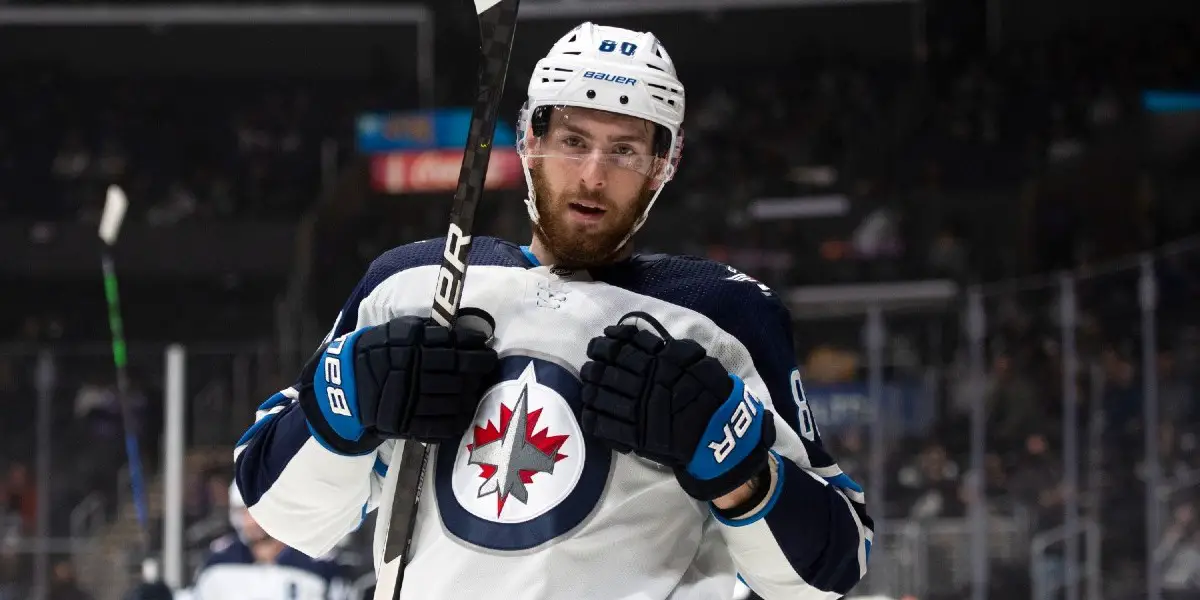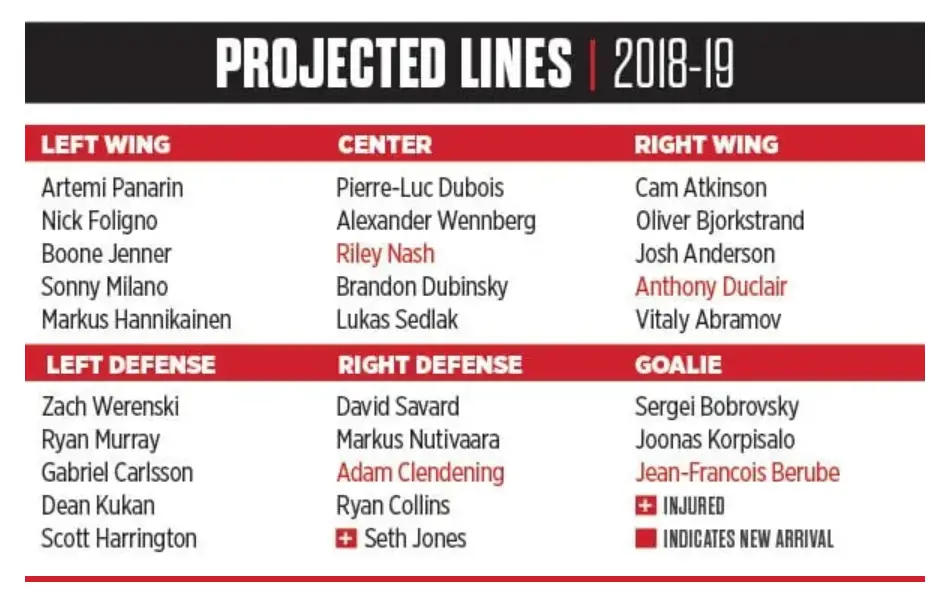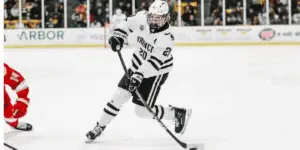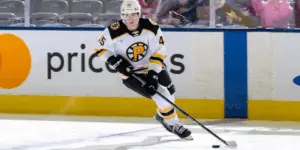
Dubois is a product of the Cape Breton Screaming Eagles and the Blainville-Boisbriand Armada of the QMJHL. His best season came in 2015-16, wherein 62GP, he totaled 42 goals and 57 assists for 99 points. He was a playoff force; in 12 games that year, he was also a point-per-game player. In his final season in the QMJHL, he had an even more substantial showing with the Armada with 9 goals and 13 assists for 22 points in 19 games. He was a top three overall CHL player regarding his primary points (goals + primary assists). Much like plenty of other prospects drafted in the LA Kings organization (Tyler Toffoli, Gabriel Vilardi), Dubois entered a draft in which he was deemed not the flashiest skater but had intangibles that teams craved. A center that can play wing, with size and soft hands. Dubois’ draft position took many by surprise since the forward was anywhere projected to be ranked as high as fourth overall and some as low as eighth.
Columbus selected Dubois at third overall, surprising many because Jesse Puljujarvi expected to go third, falling to Edmonton at fourth overall. At the draft, Dubois was compared to elite power forward Jamie Benn, someone he will likely never live up to. He was expected to immediately play in the NHL and deliver a physical 2way presence in his rookie year with Columbus.
2017-18 Rookie Season
He started slowly, with only one point in his first 12 games. He finished the next 70 games with 47 points. In all, through 82 games, with 20 goals, 28 assists for 48 points. These numbers were good for third on the team and second of all forwards. He broke rookie franchise records previously set by Rick Nash for goals and points by Zack Werenski. He finished eighth in the Calder trophy vote but was one of three 19-year-olds to crack the top ten. To be fair, it was Matthew Barzal’s to lose.
He started the year at wing but moved into a comfortable role centering Josh Anderson and Artemi Panarin. He finished the year centering Panarin and Cam Atkinson on the top line. He had slowly gained the trust of John Tortorella, a coach famous for being tough on his players, “Coach John Tortorella continually raved about Dubois’ fearlessness. He wasn’t scared of any situation, Tortorella proudly noted, and he was mature enough to handle those responsibilities” (The Columbus Dispatch). This would be a situation that deteriorated over time.
They were locked into a first-round matchup with the Washington Capitals by making the playoffs, by which they took the first two games. These games included two assists from Dubois in game one. He played over 23 mins in games one and two. Despite Dubois’ 31 mins of TOI and a goal to tie the game in the second period, the Blue Jackets dropped game three in double overtime.
The Jackets fell apart after the double overtime and lost the remaining three games. Dubois was a minus-two in game five while seeing a fair share of ice time against Kuznetsov, Backstrom, Ovechkin, and Wilson. Dubois had a strong Corsi showing, an On-Ice goal differential, and an overall first-round taste of playoffs for the young center iceman. The Caps went on the win it all.
Dubois left for the Ice Hockey World Championship to play as a depth center on a Team Canada that featured centers Connor McDavid, Ryan O’Reilly, and Bo Horvat. Even as a depth center on a stacked roster, Dubois finished with three goals and four assists for seven points in nine games. Team Canada would lose to the US in the Bronze medal game 4-1.
2018-19 Draft Year + 1

Sophomore slump? Dubois finished his arguably strongest season of his career in year two: playing all 82 games, scoring 27 goals, and adding 34 assists for 61 points as a +16. While he posted substantial numbers, his TOI was all over the place during the regular season. At times he played over 20 mins at the true 1C, and there were games where he played as low as 9 mins. He had 64 PIM and became more of a pest around the league.
The Jackets and Dubois squeaked into the playoffs and had to face the (then) record-setting Tampa Bay Lightning President Trophy-winning team on the cusp of greatness.
While Dubois was sheltered more as the 2C during this colossal upset of Tampa Bay as he never broke 17 mins a game and finished a +1 on the series, he came to play in game four to close out the sweep with a goal and two assists in an emphatic 7-3 win at home.
Dubois saw higher usage in the next round against the future Stanley Cup finalists in, the Boston Bruins, even scoring a go-ahead goal in the losing effort in overtime in the opening game. The Jackets were ousted in six games; Dubois had been tasked as a 20-year-old to go toe to toe with Selke Darling and future first-ballot hall-of-famer Patrice Bergeron. Dubois finished the series with just one goal, one assist for two points, and a minus-five.
Dubois would return to a star-studded Canadian team for the Ice Hockey World Championship. This time it would be Finland beating the Canadians in the gold medal game. Dubois finished with three goals and four assists in eight games while elevated to a top-line role at times, centering Jonathan Marchesseault and Mark Stone.
Key Takeaways
Pierre Luc Dubois was a surprise pick at number three overall but was still a lock in the top ten. He was a tantalizing center projected to be a 1A, with player comparisons to Jamie Benn. He joined a star-studded team on the rise, one that forward corps included: Cam Atkinson, Boone Jenner, Artemi Panarin, Nick Foligno, and Josh Anderson. The defense had David Savard, Seth Jones, and Zach Werenski. Goaltending was anchored by two-time Vezina winner Sergei Bobrovsky. That’s a remarkable build if you really think about it.
Starting as a winger, Dubois moved to center and played top-six minutes in his rookie season, breaking franchise records for rookie players within the Blue Jacket organization. Only a few players have shown the ability to adapt and be an impact players in their first year in the league: the list includes exceptional players such as Connor McDavid, Auston Matthews, Jack Eichel… you get the gist. His production was not reflective of the upper echelon of those players, but he played top-six and top-line minutes in the playoffs in his first two seasons. Each playoff series loss was to the eventual champions and then the runner-up. Afterward, he teamed up with his national team for the World Championships, in which he found success deployed in a minimal role as well as an elevated role. Team Canada would disappoint in both years.
Surrounded by stars, Dubois was blossoming, backed up by his best overall season, except for his point total. His coach trusted him, for Dubois was all situational in his first two seasons. This was soon to deteriorate, and so was the surrounding cast/belief system. Columbus has proven to be a wayfarer station since its inaugural season in 2000. Before Dubois, big names such as franchise icon Rick Nash and LA Kings championship trade deadline acquisitions of Jeff Carter and Marian Gaborik backed up the theory that players don’t come to Columbus to win. The Jackets, during Dubois’ first two seasons, had a deep team with all the right players to make a deep run. Two playoff exits started to form cracks in the belief system, from top to bottom.
2019-2021 Coming soon.
Discover more from Inside The Rink
Subscribe to get the latest posts sent to your email.



